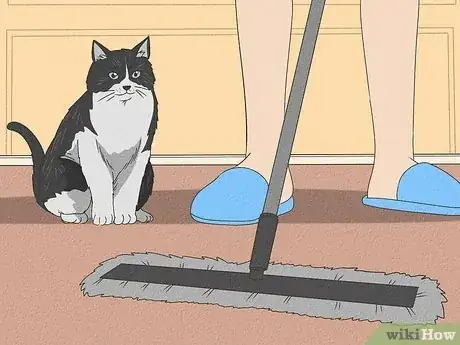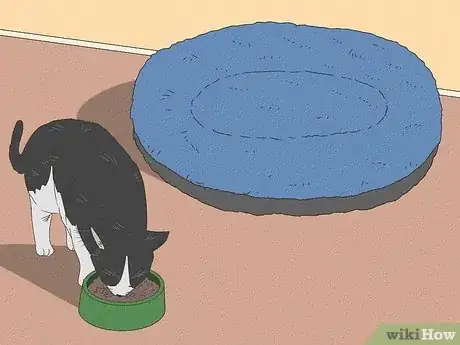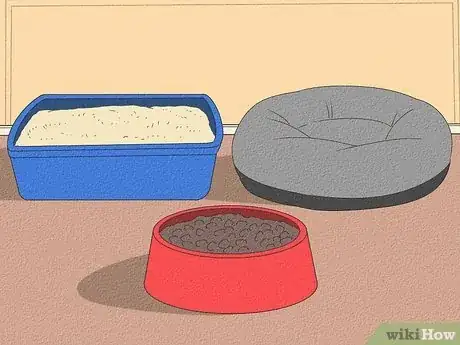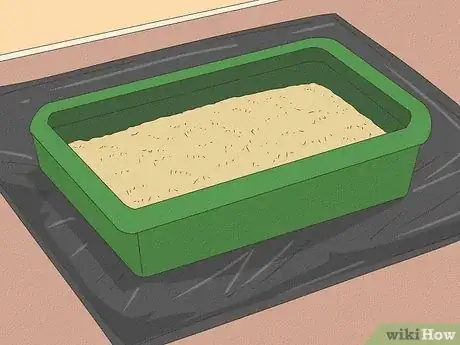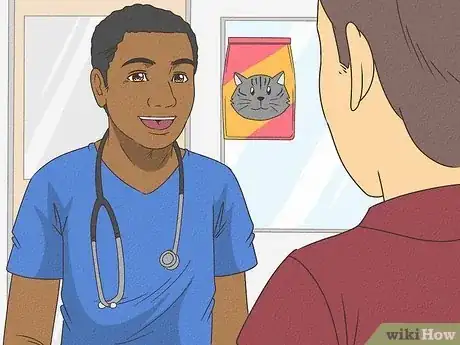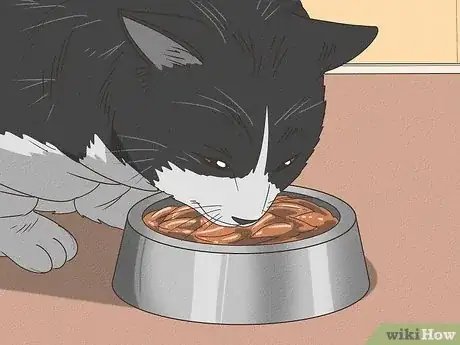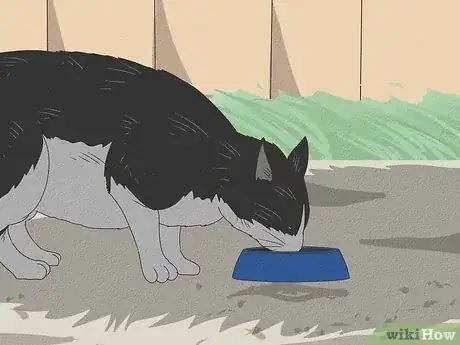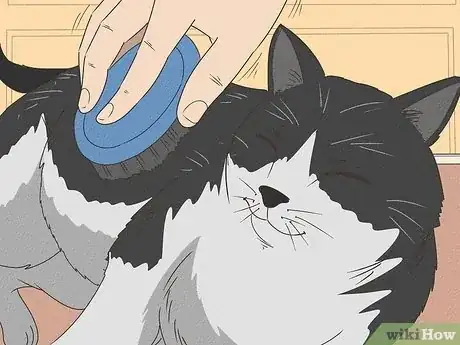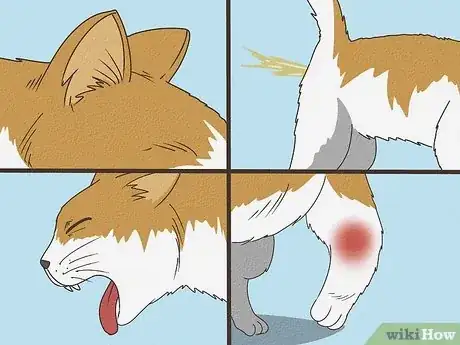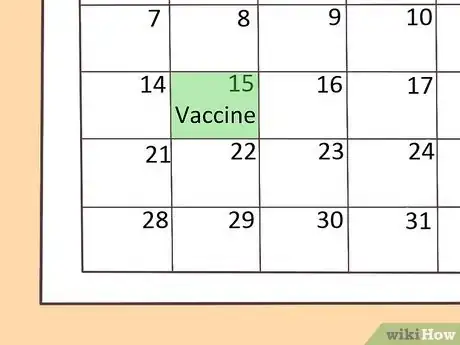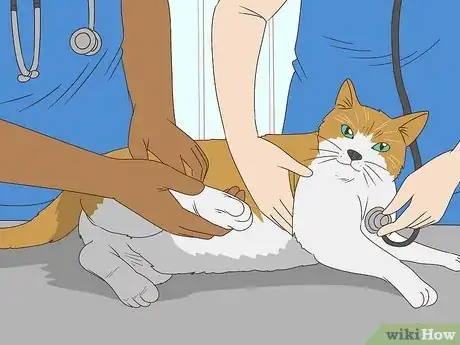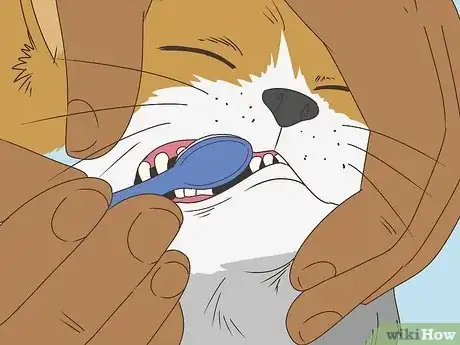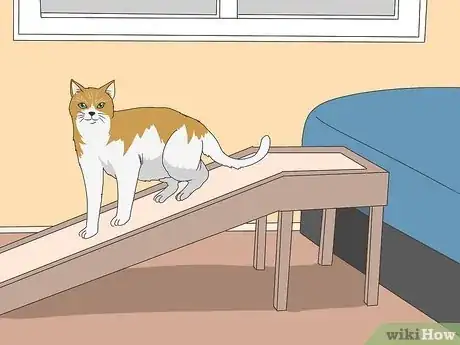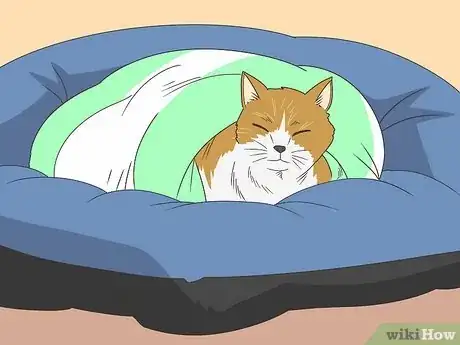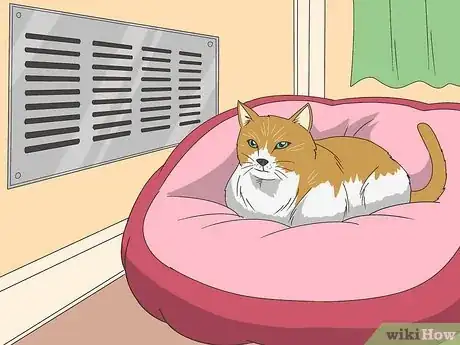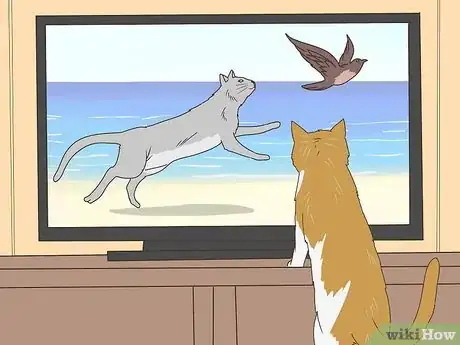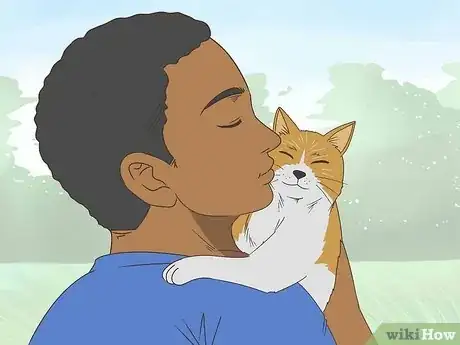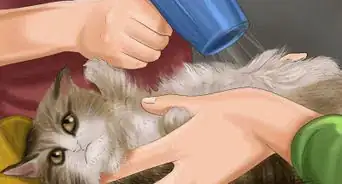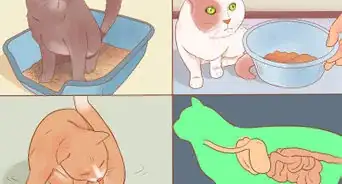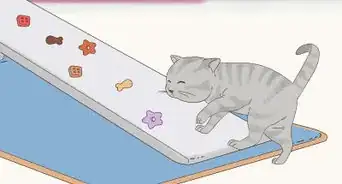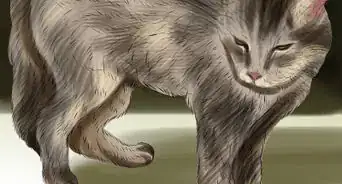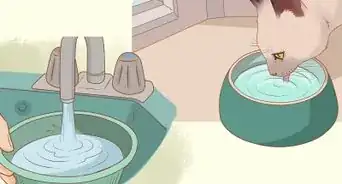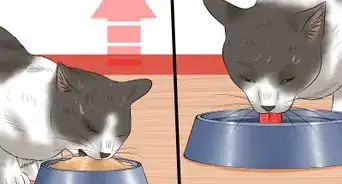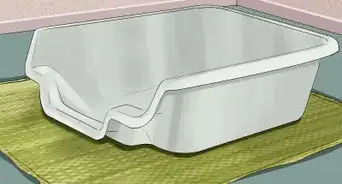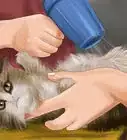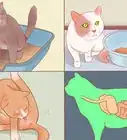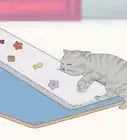This article was co-authored by Deanne Pawlisch, CVT, MA. Deanne Pawlisch is a Certified Veterinary Technician, who does corporate training for veterinary practices and has taught at the NAVTA-approved Veterinary Assistant Program at the Harper College in Illinois and in 2011 was elected to the board of the Veterinary Emergency and Critical Care Foundation. Deanne has been a Board Member of the Veterinary Emergency and Critical Care Foundation in San Antonio, Texas since 2011. She holds a BS in Anthropology from Loyola University and an MA in Anthropology from Northern Illinois University.
This article has been viewed 65,856 times.
As your cat gets older, its abilities, preferences, and needs change. A senior cat, which is older than 10 years old, will typically require more veterinary care, changes to its basic care, and adjustments to the way you interact with it. As a cat owner, it is your responsibility to implement these changes when taking care of an older cat. With a little effort on your part, your aging cat can thrive during its later years.
Steps
Organizing Your Home for an Older Cat
-
1Declutter your home. Some older cats tend to experience a decrease in their eyesight or hearing as they age. This may mean that your formerly agile cat will bump into things if they are stacked up around your house. Removing clutter will help an elderly cat to navigate it more easily.
-
2Keep items in consistent locations. Keeping items in your home in their usual spots will allow an older cat to find them easily. For example, try to maintain the cat's sleeping and eating areas in the same place. This is especially important for cats that are losing their sight. Having items in your house in a reliable location will help a blind cat move through its home without bumping into things.
- If you move, keep its old blankets, sleeping baskets, and food bowls to restore a sense of normalcy in the new house.
- You may also want to keep a light on during the night so that your cat can find its way around the house. If a cat's eyesight is fading, it will not be able to see in the dark as well as it once did.
Advertisement -
3Place necessary items in accessible spots. While a young, agile cat may be able to climb or jump to get its needs met, an older cat shouldn't have to. For example, the cat's litter box, food and water dishes, cat bed, and your bed (if the cat likes to sleep there) should be easily accessible to the cat.
- You can buy little steps for your cat to help it climb onto your bed or wherever it likes to sleep. However, in many cases you can just arrange your furniture to provide this extra step.
-
4Make the litter box area more secure. Remember that older cats are more likely to "miss" when using the litter box. Put its litter box on a plastic sheet or simply put it in an area that is easy to clean. That way, if the elderly cat misses the box or tracks litter out of the box, the mess can be cleaned up easily.
- If you have the room, try putting the litter box in a small plastic swimming pool with a hole cut in the front. This will allow your cat to get in to do its business while containing its mess in something that can be easily cleaned.
Caring for Your Elderly Cat's Basic Needs
-
1Adjust your cat's diet. If your cat is in generally good health but is getting older, discuss changing to a food formulated especially for elderly cats with your vet. However, if your cat is getting too thin or overweight, the veterinarian may suggest gradual adjustments to your cat's diet.
- If your cat's weight has fluctuated, it could indicate disease or an improper diet. Have your cat looked at by a veterinarian to figure out the cause.
-
2Feed your cat soft food. As cats get older, their teeth can become weaker, and they can develop dental or gum disease. When your older cat crunches down on its hard kibble, it might experience pain, and it could even crack or lose a tooth. To avoid causing your senior cat pain, transition it onto wet food.
- Discuss your cat’s dental health and any necessary food changes with your veterinarian. They should be able to point you towards a diet that will fulfill your cat's dietary needs and that will be easy on your cat's teeth.
- Wet food can also add water to your cat's system. This is good for older cats, as they can become dehydrated easily.
-
3Leave a water bowl out at all times. Older cats need more water than younger cats and can become dehydrated easily. Be sure to change the water daily and clean out the bowl every time you change the water.
- If your cat spends time outside in the summer, put water outside for your cat. Use a narrow, deep bowl and put it in the shade. If you want to, you can also put some ice in it to keep it cool.
-
4Groom your cat gently. Older cats may or may not groom themselves, so be sure to groom them daily. Watch out for matted fur and only brush or comb gently, as an older cat's skin tends to be more delicate. With some help from you, your cat's coat can continue to be healthy well into old age.
- It is especially important to groom the areas of an older cat's body that it can no longer reach. With limited mobility, an older cat may not be able to clean the rear end of its body like it used to.
Caring for Your Elderly Cat's Health
-
1Pay attention to changes in your cat. Changes in behavior and personality can signal health problems or just normal changes. To differentiate between the two, take your cat to be seen by a vet if it changes its daily routine or the activities it enjoys.
- An older cat might not like the food it used to or it may not even want to eat at all. It might also lose a little weight. Any of these issues are reason enough to have your cat looked at by a vet.
- If your cat suddenly bites or scratches you more often, take it to the vet. These behavior problems could signal a medical problem that is causing your cat pain and irritability.
-
2Be alert for common health problems. It is important to be aware of the potential problems that can occur to older cats and to keep an eye out for them. This includes such problems and diseases as:
-
3Keep up to date on vaccinations and medications. As your cat gets older, it will be more likely to get ill and it can have a harder time recovering from illness. In order to avoid many possible illnesses, be diligent about keeping vaccinations and medications up to date.
- Older cats may be particularly susceptible to certain infections due to decreases in their immune systems and an inability to groom themselves as much as they once did.
- Elderly cats often require medications for chronic conditions. A cat with feline arthritis may need regular pain medicine as well as vitamin supplements.
-
4Have your elderly cat examined more often by a vet. It you are used to taking your cat to visit the vet once a year, you should start taking the cat in twice a year. This is because elderly cats are more likely to develop health problems, and it is important that they are caught as soon as possible.[1]
-
5Give regular dental care. Older cats are especially prone to plaque buildup on their teeth, and dental disease. The vet can clean their teeth but daily brushing with a toothpaste made for cats will be easier on the cat and will prevent the problems before they develop.
- Elderly cats with sore gums or dental disease may avoid eating and become malnourished. If your cat has lost weight or has stopped eating, it may be caused by dental problems.
-
6Modify your cat’s environment to meet its specific health needs. If your cat receives a diagnosis, discuss the necessary environmental and lifestyle modifications with your veterinarian. Each condition can require unique accommodations.
- If your cat suffers from hearing loss, everyone will need to learn to approach your cat slowly and gently in order to avoid startling it.
- For a cat with arthritis, you may need to introduce ramps or steps for it to comfortably access higher locations.
Making Life Enjoyable for Your Elderly Cat
-
1Make your cat comfortable. When your cat gets older, it will need more specific care centered around its comfort. An aging body can have aches and pains that require a soft surface to rest on. To keep it comfortable, give your cat soft blankets, pillows, or beds to sleep on.
- At minimum, get a comfortable couch or cat bed so the cat can lay on a soft surface.
-
2Keep the cat warm. Elderly cats can be the most cuddly of all, really craving the warmth of a human body at night. They will also want to stay warm during the day, so they tend toward areas next to heat vents or in warm rays of sunshine. If you have an older cat, make sure that it has access to a warm spot of its own.
- Make sure it stays warm when you're not home, either by cranking up the heat in your house or giving it a heated cat bed. Overall, you want to make sure that the cat can curl up in a warm and cozy spot to nap the day away.
-
3Entertain your cat. Even when a cat is older, it will still need mental stimulation even if its body may not be able to move as well as it used to. With this in mind, provide toys that are easy to play with and items that stimulate your cat's mind without making it move its body. This can be as simple as giving your cat access to a view outside or playing cat videos on your TV for your cat to enjoy.
- You can find videos of birds, cats, and other wildlife designed to entertain cats. These videos are available for free online. You can also check with your TV provider for stations devoted to entertaining cats.
- Try bringing a cardboard box into your home and putting it on its side. Your older can may enjoy investigating this new item and pushing it around.
- Another idea is to can get some fish, put them in a tank, and set them somewhere kitty will find them.
-
4Give your cat lots of love. Spend quality time with your cat every day. Pet your cat if it likes to be petted and rubbed, hold it in your lap, and play games with it that it loves. Giving it love and attention is key to making most older cats contented.[2]
- However, don't disturb your cat when it's asleep or if it has given you signs that it is not interested in interacting with you right now.
Warnings
- Some cats do not like loud noises, such as the sound produced by drums, fireworks, and vacuum cleaners. Do not run up and scream or bang things loudly at the cat.⧼thumbs_response⧽
Things You'll Need
- Cat litter
- Cat litter box
- Cat brush
- Cat bed
- Collar
- Water bowl
- Clean water
- Cat food bowl
- Soft cat food
References
About This Article
To take care of your aging cat, try decluttering your home, since older cats often start to lose their hearing and vision and could bump into things. You should also place important items like its food, water, and litter box on the ground in accessible spots so it doesn’t have to jump to reach anything. Besides making your home more accessible, you may consider switching your cat to wet food, which is gentler on an older cat’s teeth. Additionally, older cats need more water than younger cats, so make sure to clean and refill its water dish more frequently. Keep in mind that older cat’s are also more likely to develop health problems, so make sure to take it to the vet for a checkup at least every 6 months. To learn how to keep your older cat entertained, read more from our Veterinary co-author!
